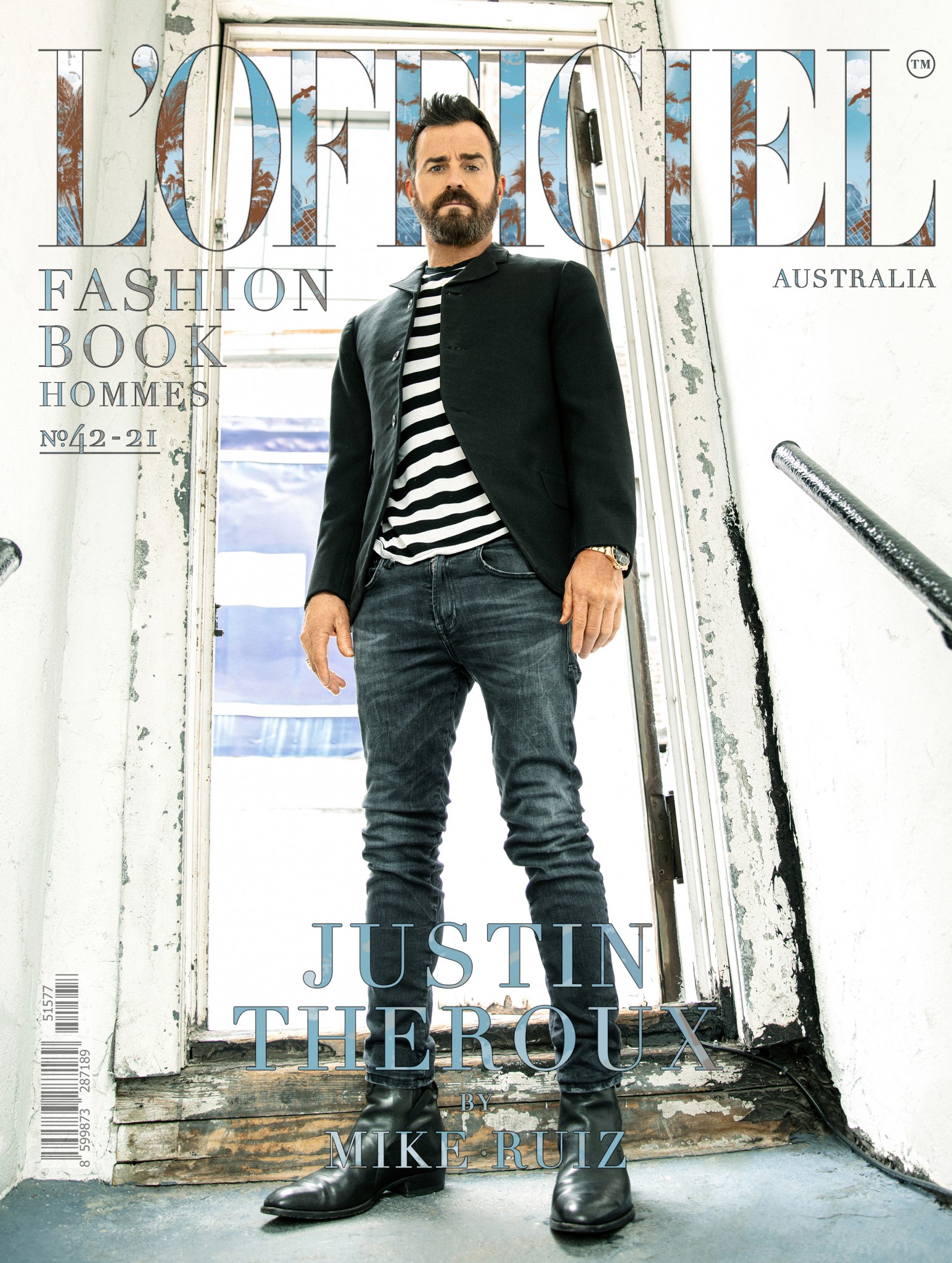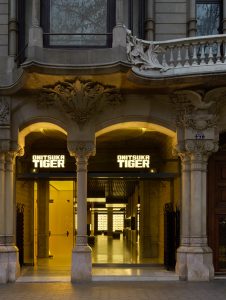
Talent: Justin Theroux
Photography, Creative Direction, and Production by: Mike Ruiz
Editor-in-Chief: Dimitri Vorontsov
Stylist: Chloe Harstein
Hair: DJ Quintero
Groomer: Jenn Streicher
Location: New York, New York

Congratulations on the outstanding show The Mosquito Coast.
Can you tell us how did you all come together to create the modern adaptation of your uncle’s novel The Mosquito Coast by Paul Theroux? Did Neil Cross approach you to be part of The Mosquito Coast?
It was one of the things. I’d love to say that I had a hand in it, but it was one of those things that I heard about it. I heard that this company, Fremantle, and Apple had acquired it. They were ramping up development of it and there was a script for it, and so I was just curious and I thought, “Oh, that could be interesting.” I called my people and then said, “Hey, I want to raise my hand and see if they might be interested in.” I ended up meeting with Neil Cross and having just a lazy lunch together and read the script, of course, and loved it. I thought this could be really fun to do and we just went down the normal road of things. As we really got closer to shooting, we dug in on things that we could do to make it as interesting as possible.
Who’s idea was to make this tv series into a prequel to the novel?
I think Neil’s. He basically had to make some tough decisions, which is, we were serializing it, making it a long-form television show and he wanted, with that much real estate in front of us, he had to make a couple of decisions and he thought it would be interesting and good to delay the arrival of the materials that are in the book and be a season where it gets us into position, so to speak. We basically did it like that.
How did you, as a creative team think of the fresh interpretation of the characters compare to Paul Theroux’s novel that was written 40 years ago?
Neil Cross made a couple of great changes. We made several other changes too, he for example, he really wrote up the mother character, which in the book doesn’t even have a name, she’s just called mother. Then he created Margot, he also swapped out Charlie in the book for Dina, the older son ended up being the older daughter. Obviously, Charlie is still in it as well. Yes, I think he just had the intuit what changes needed to be made in order to make it a series.
Your uncle, Paul Theroux based several of the original characters on your family members. Did you recognize any of them when you first read the novel or with time?
Absolutely, I recognized them right away when I read it. I read it when I was probably around 14, about the same age as Charlie, in the book. Yes, immediately I recognized some of the characters as being awfully close to other family members, in particular, my grandfather, and even the boys in the book had a whiff of my cousins Marcel and Louie, but the character of Allie for sure had a smattering of many family members, Paul included, I think.

How relevant is the show in these uncertain times?
Obviously, the family that is in our show is a very particular family but I think the one thing that everyone can relate to, although not necessarily being on the run, is that desire to just leave the kettle on and slam the door behind you to your house and just go and get away from it all, and start fresh. That’s a story that’s been used many times where it’s just this desire to just throw your current living situation over your shoulder and march out and find something else, wanderlust. We all do it in many ways when we go on vacations and we like to get lost or go to remote places. Some people like to just go to retreats and resorts and some people like to find proper adventure. I think this is just a magnification of that. I think it definitely scratches an itch for a lot of people, that desire to be free, I guess.
From Episode One we see an emotional rollercoaster of your character, Allie Fox, an inventor, living completely off the grid, trying to provide for his family by any means while looking over the shoulder at all the time. How much heart and soul went into developing Allie as your own character? Did you discuss your character with Paul Theroux?
That was the fun part. Obviously, I knew the character, I knew the book and the movie, every element of it, but once you start to play it, it’s a totally different thing altogether. It was just wonderful to be able to pick up the phone and call Paul and say, “Is it like this? Or is it more like that? were you thinking this or are you thinking that?” Just to have that resource available is invaluable.
Have you lived off the grid?
I did a lot of that. The one gift that my family gave me just inadvertently or maybe on purpose when I was younger was the desire to travel. Paul obviously is a very traveled person. I did a lot of traveling early on in my teens and twenties and even late twenties, you know, I was constantly going to very far-flung places. I sort of, I wouldn’t say got that out of my system because I still like to do it. I don’t have the desire to go so far afield, but all the proper traveling the remote countries where you don’t speak the language where it might be difficult to travel through, I’ve done quite a bit of. I’ve been fairly fortunate, not sort of being a tourist.

Do you think your character Allie was doing the right thing to withhold the true nature of the Fox Family being on the run from your “onscreen” son Charlie (Gabriel Bateman), and daughter Dina (Logan Polish)?
I think it was a function of necessity. I don’t know. I think the one virtuous thing about the Allie character is that he will obfuscate, meaning he will not say something or he will omit something but he doesn’t lie and he’s not a bastard really. He will say, “I’m not going to tell you that just yet.” Or, “Here’s what we’re actually going to do.” He makes good on a lot of his promises. For better or worse. His kids are in a tough spot because they’re at that age where they’re too young to really make their own decisions and say, “I’m just leaving,” they still don’t get a vote necessarily, but they’re old enough to know that something is wrong or something is not very right. To a certain extent, it would be easier if they were toddlers because we don’t need to tell the toddler why you’re doing it. They just go along and as long as they’re fed and have somewhere to sleep they’re happy. If anything, it just makes it more interesting. I’m sure it will be revealed.
Your character Allie is an anti-consumerist and makes a great statement in Episode Two. Do you think we as a society over-consume especially at the expense of public welfare and environmental protection?
We are absolutely over-consumed, but it’s death by a trillion pricks, we over-consume every day in very small ways. The most obvious one is just plastic, everything you buy is in plastic, when you carry it home it’s in plastic, when you drink something it’s in plastic. Plastic, that invention, although, I’m sure made with the best intentions has really, and that’s just one thing, done an enormous amount of damage.
The other thing is, I agree with that speech that Allie gives about, I don’t agree with his point of view necessarily, but we’ve become a society that doesn’t fix things anymore, you buy a car, you run it to the ground and you throw it away. Televisions, we don’t fix them, we buy televisions and then we wait for a newer one and then we throw the other one away. Everything is disposable, telephones, computers. It’s that sort of thing off because technology is moving at such a rapid pace, we think that we need the next new one, or we need to just basically replace everything every couple of years. At least when I was growing up if your television broke we took it to a TV repairman. I haven’t seen a TV repair shop, in New York City at least, in probably 30 years. I wouldn’t even know where to bring a television if it broke.

The dynamic of the show builds quickly to full-on action mode that keeps you on the edge of the seat and the suspense of Season One keeps building when it shifts from authorities’ chase to narco-noir theme of the vast landscapes in Mexico. As an Executive producer, are you happy with the result?
Absolutely. We had so many beautiful locations, some of them beautiful and incredibly difficult, like the desert location. Some of them beautiful and just beautiful, obviously in the last episode where we arrived at this beach, which was shot Punta Mita, Sayulita in Mexico, and it was just gorgeous. We really were lucky, we got to shoot so many different locations, because of the nature of the story, where we were cruising through all of Mexico. We did the journey which the Foxes did, obviously in much more comfortable circumstances.
The tension between Margot (Melissa George) and Allie has finally peaked in Episode Six but it is still cryptic and only two of them know the answer. Is this the moment when Allie pushed Margot over the edge to make her own fate for her family?
Well, they’re in this incredibly difficult position, and that they have to remain allies, at least for as long as possible for the good of the unit. This is the long car ride with the family in the station wagon, a married couple is going to bicker, but when you’re in these extraordinary circumstances, the stakes are obviously much higher. I think they’re going to have to figure out a way to square that circle eventually. I think all of them are being pushed into incredibly uncomfortable places, the kids included.

We see Butterflies throughout the season. Are they metaphorical like “The butterfly effect” or any other reasons?
The butterflies, I always thought of it like a good omen for the Foxes. It’s open to interpretation I suppose. It’s also grounded in reality because there is a big Monarch butterfly migration that happens every year in Mexico, where butterflies in mass make this migration. It’s one of the things that’s built on story and also open for interpretation.
Have you enjoyed working with your cast members?
Of course! Melissa, I’ve known for a long time, but never worked with her this closely, so that’s been wonderful and also we were just incredibly fortunate to cast the two other actors, both Charlie and Dina who were, I’d say, incredibly good and, not their first time out of the gate, but at least their second or third. Then we had also this rotating cast of wonderful other actors, we had Ian Hart, Paterson Joseph. It was lucky to have a great core cast who is very talented and very professional, and then to have the incredible hitters coming in for all the other roles.
You met Harrison Ford while you were filming The Mosquito Coast in Mexico. Can you tell us about it? Did you discuss your The Mosquito Coast tv-series and his 1986 film adaptation when the two of you met?
Yes, we had a mutual friend who introduced us in Mexico City. He happened to be coming through while we were shooting there to promote something. We said, “Yes, let’s have dinner.” He was only in town for a couple of days. We just had this big, long, gorgeous dinner with lots of tequila and great food. We only late in the meal touched on Mosquito Coast, but we didn’t really dig into the themes or the whatever. I was more curious about how he was, what that experience was like for him. I think he’s even said this before, where he really credited with being one of the happiest shooting experiences you’ve ever had.
They were shooting down in Belize, in Central America. He had rented a boat that he just docked and he lived on, but he’d go shoot during the day and then come back to his boat, make food on it. He was living a very obviously, much more peaceful existence than Alley Fox, but an Alley Fox off-the-radar existence for the time that they were shooting that. Other than that, he’s a fascinating guy, you think that when two actors get together, they want to talk about it as acting. It’s probably the last thing they want to talk about. It was for me and it seemed like it was for him. We talked about carpentry, he’s a pilot and we talked about him flying, and it was just shot shit in a wonderful way. You’d think it would be all Star Wars and Blade Runner.

The Mosquito Coast has just been renewed for Season 2. Are you looking forward to coming back to your character?
I am, yes. I’m looking forward to the end of the story. I think I don’t want to give anything anyway…
Please do!
It feels like we’re going to get a place, finally, when hopefully we’ll be able to catch our breath, and we still have so much of the book to burn through. That part will be very interesting.
Basically, the book starts when Season 1 ends, in terms of a prequel. It’s still going to be a free format?
I don’t want to say. It’s still very difficult to just go… It’s not like we can go right into the book. Truthfully, because the book was written in the ’80s, almost 40 years ago now, there’s a certain amount of updating that has to happen anyway. Just because the technology was different, the world was different. The world was arguably smaller. In the book, for example, and in the movie, they trudge through the jungle to find a remote tribe that hasn’t seen White people, for example. I think that’s going to be hard to pull off in our Season 2, just because of where we’re going and where we are. Yes, we’ll delve into the book but there will obviously be differences.

Your Rescue Dog Kuma appears on the cover with you, and she looks fantastic on the cover! Can you tell us Kuma’s story? How did she come into your life?
I was driving cross-country and I knew I was going to get a dog, and as I was driving cross-country, I was stopping into various Shelters, and just meeting dogs. I do some work with a Shelter in Texas called Austin Pets Alive, a wonderful, no-kill shelter. I had stopped in Austin for a week, just a midway point to stretch my legs a little, and was hanging out with some of the Austin Pets Alive people. Then I heard that there was a dog that was about two hours away just outside of Houston. Of course, I saw a picture of her and immediately fell in love. I jumped in the car and went to go see her. We just fell in love on the spot. She was just one of those dogs that run across the Shelter at you and throw herself into your arms, and you think, “This is my dog.”
I’ve had that experience a couple of times. I had a little bit of groundwork to do. I had to come run back up to New York, get my apartment ready for her. Then she came up, she was a hurricane Harvey Rescue. She was discarded, I guess. I think she was an absolutely homeless dog and she had all kinds of horrible skin conditions and not a lot of fur and she just recovered.
There’s of love that went into recovery.
Yes, yes but I got to say these wonderful people who rescued her did the majority of the work before I even got there, but she was really a tough luck kid.
That’s amazing.
She’s beautiful. She’s a perfect dog and I’ve had many pit bulls now. They’re one of the most euthanized breeds of dogs in our country.
You are a pit bull advocate as our creative director and photographer Mike Ruiz who photographed you and Kuma for the cover.
He’s a huge pit bull advocate!
Can you tell us what do you love about pit bulls?
Their personalities are fabulous. I’ve had other dogs. I’ve had a pit bull mix who was kind of aloof. I’ve had various other terriers but pit bulls are really goofy, fun-loving dogs. They love to have fun. They’re very affectionate. They’re very kind. All those things that some people don’t think are a trait to the pit bull are traits to the pit bull. Even their name I think it’s such a misnomer. It makes them sound terrifying. It’s weird, I think in this country we go through cycles of what the scary dog. In the ’80s it was Doberman Pincers and then in the ’90s it was Rottweilers. Dogs are dogs. If they’re raised correctly and lovingly it’s very hard to screw them up. You can screw up any dog. You can breed labradors to be vicious and fight if you wanted to but pit bulls… they’re incredibly loyal. They’re like a shadow dog, incredibly smart too.
As we all faced a difficult pandemic, how did you stay motivated and keep in touch with your friends and family?
There’s something galvanizing when something happens en masse to a group of people or a city or in this case a world where there is almost like a camaraderie in that. When I lived in New York, the one I can think of is 9/11. There was a galvanizing effect where people can come together and try and at least do their part to solve the problem.
It was very touching to be in New York in the early pandemic because obviously, it was terrifying but it definitely put us in closer touch with our neighbors, the people that worked in the shops around us that became very kind and very sweet and endearing. Obviously, the technology such that we can bleep anyone up on a Zoom and talk to them. It’s not like we were completely isolated.
I think what a lot of us did was like I gave myself an itinerary every day. Just to wake up, make coffee, work out, go shopping, get food, make food, go to bed. It was not hard. Maybe it was hard but it wasn’t – I kept myself busy. I think it’s the recipe for people who were boring or shipwrecked, you should just make sure you have something to do every day even if it’s ridiculously small.
If you had a chance to give your younger self a piece of advice, what it would be?
Don’t worry. The only advice you can give in retrospect, you can’t ever give this advice. I’m sure someone told it to me probably when I was younger, but don’t take everything so hard. Don’t worry. Life has a way of providing. I was incredibly anxious as a younger person. I’m just nervous that my life was not going to start. I would have told myself to relax and have a little more fun.






No comment yet, add your voice below!